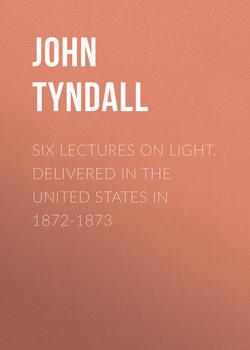Читать книгу Six Lectures on Light. Delivered In The United States In 1872-1873 - John Tyndall - Страница 12
LECTURE II
§ 1. Origin and Scope of Physical Theories
ОглавлениеWe might vary and extend our experiments on Light indefinitely, and they certainly would prove us to possess a wonderful mastery over the phenomena. But the vesture of the agent only would thus be revealed, not the agent itself. The human mind, however, is so constituted that it can never rest satisfied with this outward view of natural things. Brightness and freshness take possession of the mind when it is crossed by the light of principles, showing the facts of Nature to be organically connected.
Let us, then, inquire what this thing is that we have been generating, reflecting, refracting and analyzing.
In doing this, we shall learn that the life of the experimental philosopher is twofold. He lives, in his vocation, a life of the senses, using his hands, eyes, and ears in his experiments: but such a question as that now before us carries him beyond the margin of the senses. He cannot consider, much less answer, the question, 'What is light?' without transporting himself to a world which underlies the sensible one, and out of which all optical phenomena spring. To realise this subsensible world the mind must possess a certain pictorial power. It must be able to form definite images of the things which that world contains; and to say that, if such or such a state of things exist in the subsensible world, then the phenomena of the sensible one must, of necessity, grow out of this state of things. Physical theories are thus formed, the truth of which is inferred from their power to explain the known and to predict the unknown.
This conception of physical theory implies, as you perceive, the exercise of the imagination—a word which seems to render many respectable people, both in the ranks of science and out of them, uncomfortable. That men in the ranks of science should feel thus is, I think, a proof that they have suffered themselves to be misled by the popular definition of a great faculty, instead of observing its operation in their own minds. Without imagination we cannot take a step beyond the bourne of the mere animal world, perhaps not even to the edge of this one. But, in speaking thus of imagination, I do not mean a riotous power which deals capriciously with facts, but a well-ordered and disciplined power, whose sole function is to form such conceptions as the intellect imperatively demands. Imagination, thus exercised, never really severs itself from the world of fact. This is the storehouse from which its materials are derived; and the magic of its art consists, not in creating things anew, but in so changing the magnitude, position, grouping, and other relations of sensible things, as to render them fit for the requirements of the intellect in the subsensible world.9
Descartes imagined space to be filled with something that transmitted light instantaneously. Firstly, because, in his experience, no measurable interval was known to exist between the appearance of a flash of light, however distant, and its effect upon consciousness; and secondly, because, as far as his experience went, no physical power is conveyed from place to place without a vehicle. But his imagination helped itself farther by illustrations drawn from the world of fact. 'When,' he says,' one walks in darkness with staff in hand, the moment the distant end of the staff strikes an obstacle the hand feels it. This explains what might otherwise be thought strange, that the light reaches us instantaneously from the sun. I wish thee to believe that light in the bodies that we call luminous is nothing more than a very brisk and violent motion, which, by means of the air and other transparent media, is conveyed to the eye, exactly as the shock through the walking-stick reaches the hand of a blind man. This is instantaneous, and would be so even if the intervening distance were greater than that between earth and heaven. It is therefore no more necessary that anything material should reach the eye from the luminous object, than that something should be sent from the ground to the hand of the blind man when he is conscious of the shock of his staff.' The celebrated Robert Hooke at first threw doubt upon this notion of Descartes, but he afterwards substantially espoused it. The belief in instantaneous transmission was destroyed by the discovery of Roemer referred to in our last lecture.
9
The following charming extract, bearing upon this point, was discovered and written out for me by my deeply lamented friend Dr. Bence Jones, when Hon. Secretary to the Royal Institution:—
'In every kind of magnitude there is a degree or sort to which our sense is proportioned, the perception and knowledge of which is of the greatest use to mankind. The same is the groundwork of philosophy; for, though all sorts and degrees are equally the object of philosophical speculation, yet it is from those which are proportioned to sense that a philosopher must set out in his inquiries, ascending or descending afterwards as his pursuits may require. He does well indeed to take his views from many points of sight, and supply the defects of sense by a well-regulated imagination; nor is he to be confined by any limit in space or time; but, as his knowledge of Nature is founded on the observation of sensible things, he must begin with these, and must often return to them to examine his progress by them. Here is his secure hold: and as he sets out from thence, so if he likewise trace not often his steps backwards with caution, he will be in hazard of losing his way in the labyrinths of Nature.'—(Maclaurin: An Account of Sir I. Newton's Philosophical Discoveries. Written 1728; second edition, 1750; pp. 18, 19.)
